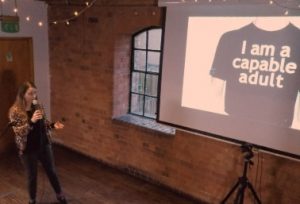First published on People First.
Autonomy, mastery and purpose
 I believe we’ve all heard the phrase ‘autonomy, mastery and purpose’ before. It’s supposed to play a big role in our lives, specifically at work. And it does! But did you know you can use learning to promote autonomy, passion and performance?
I believe we’ve all heard the phrase ‘autonomy, mastery and purpose’ before. It’s supposed to play a big role in our lives, specifically at work. And it does! But did you know you can use learning to promote autonomy, passion and performance?
As capable adults, we can and want to make our own decisions, and we should be trusted to do so.
We want autonomy over when, how and where we work or learn. We want to become masters in what we do. That should be our purpose, or at least part of it.
It seems surreal that a lot of people sit at their desks doing nothing productive just so they can show attendance.
A study published on Chron, a US newspaper, “shows that when employees are given the freedom associated with autonomy, job satisfaction rises. It’s theorized that this increased level of job satisfaction in employees stems from a feeling of greater responsibility for the quality of their work.” CIPHR claims that “Autonomy may also be the most important factor when nurturing a culture of engagement within a company.” And that makes sense, because when you have responsibility over what you do and how and when you do it, you usually put more effort into it than when someone tells you to do something. You are also more satisfied with the results when you have done well. We already have (mostly) full autonomy in all other aspects of our lives, we are allowed to decide to rent or buy a house, have a pet or even kids. Why shouldn’t we be able to decide to work from home on Tuesday afternoon or leave early on Friday when we have finished all our work? It seems surreal that a lot of people sit at their desks doing nothing productive just so they can show attendance.
Would you still work (here) if you won the lottery?
In a recent workshop I facilitated, ‘How to create a Learning and Development strategy without a budget’, we discussed people’s passions and (interview) questions you can ask to figure out what future or current employees are particularly passionate about in their job. However, we kind of came to the conclusion that unfortunately not everyone enjoys what they are doing or are particularly passionate about work. Most people work because they need to pay rent and buy food. They might work in a field they are vaguely interested in or ‘were always good at’, but the real question might be: what would you do if you didn’t have the pressure of having to earn money?
In the workshop, we explored more questions such as ‘Would you still work (here) if you won the lottery?’. A lot of the answers were ‘I would probably do something else, something that I am more passionate about. Also, I would work part-time!’ Now there’s a thought… Volunteering came up, too.
Intrinsic motivation
We then went on to the topic of a universal basic income, where you would receive a set amount of money but without fulfilling any conditions. So, if you didn’t have the pressure of going to work to earn money, you could choose a job you really liked and actually put in a better performance because you now have an intrinsic motivation to do so. Of course, there will always be people that might not be so lucky and jobs that need doing whether or not someone actually wants to do them. But more people might be able to afford the luxury of working just to earn extra cash, to go on holidays and shopping – because that would also boost the economy. We’d get a similar effect by reducing working hours or give people the freedom to work in a ‘ROWE’ – a results-only-work-environment, where you decide when and how you work, giving you an opportunity to fit work around your lifestyle – as long as you deliver results. There is a really great book I can recommend reading, written by two former HR employees who are the founding sisters of ROWE: ‘Why work sucks and how to fix it’. NatWest is also currently doing an amazing initiative by helping people to Rethink [their] business, where working fewer hours is better for business – the one you work for and the ones you then spend your money in after work.
Use learning to promote autonomy, passion and performance
Research from the University in Birmingham from two years ago also shows that flexibility and autonomy at work has positive effects on those who get to enjoy it, such as a greater well-being: “For women, flexibility over the timing and location of their work appeared to be more beneficial allowing them to balance other tasks such as family commitments” [, … including] caring responsibilities. […] Men were found to be more impacted by job tasks, pace of work, and task order.”
There are of course things we can do to motivate people now. An example is task shifting, where people can train each other if they are bored with doing the same tasks and let’s be honest, that happens all the time. So you can use learning to promote autonomy, passion and performance.

If you can have people collaborating and take on aspects from each other, from more experienced colleagues, they can then in turn take on new aspects themselves. This way you autonomously develop and master new skills, perform better and hopefully bring with it more passion and purpose into work.
Measurable goals
What you need are tools that people can use to learn and learn from each other, communication technology such as Skype or even WhatsApp and of course opportunities to teach each other in person. Such peer-to-peer learning is one way of providing support for people to be able to reach their goals and receive immediate feedback, something we all crave so we know we’re doing alright.
So most importantly, we all need measurable goals to achieve and we need to know how they fit into the wider company picture. If we have the right tools and support, both of which can be provided by social or peer-to-peer and on the job learning to achieve our goals and bring the results, we should only be measured on these, not on the time spent at our desks. Which brings us right back to the earlier mentioned examples of shortened working hours and a results-only-working environment (ROWE).
Achieve great results and perform better
Another great book to read in this aspect is Daniel Pink’s ‘Drive’. He explains that, to create a work environment where employees are intrinsically motivated and thus more passionate about what they do and how they do it to achieve great results and perform better, you need to focus on the three key factors of autonomy, mastery and purpose:
- Through providing autonomy at work you trust and encourage people to take ownership of their own work and skill development. Remember to measure them on their achievements!
- You should see no limits to your potential and be given the tools and support you need to continue to improve your skills.
- Encourage your team to use their skills to achieve a ‘greater’ purpose. This can be outside of work, for instance, getting involved in a ‘good cause’ and charity work that they are passionate about.
So, in one sentence: if companies want more passion and engagement at work, working conditions need to provide as much autonomy as possible and people need to only be measured on their performance. Use learning to promote autonomy, passion and performance!
To find out how to use learning to promote autonomy, passion and performance of your employees, have a watch of my DisruptHR Nottingham video [5 min] or read the blog Talent attraction and retention: what employees want, what they really, really want.
